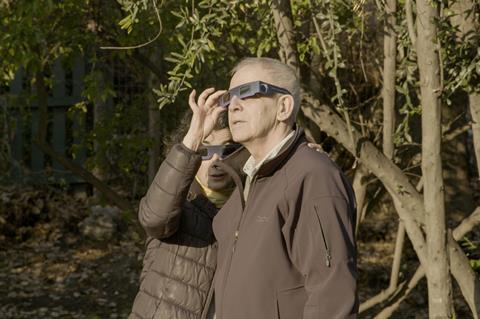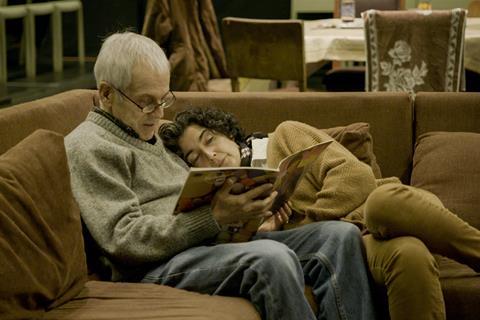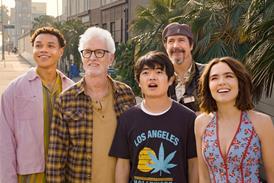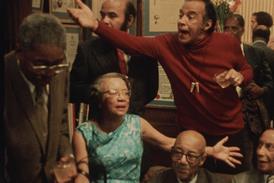Shot over five years, Oscar-shortlisted ’The Eternal Memory’ depicts a prominent Chilean TV journalist’s battle with dementia. But this is really a story about the power of love, filmmaker Maite Alberdi tells Screen

During the Pinochet dictatorship in Chile, left-wing journalist Augusto Gongora was part of a group that courageously produced clandestine news reports, telling the truth that was suppressed by the military-controlled media. After the dictatorship collapsed in 1990, he had a new mission — to restore Chile’s pride in its art and culture.
“He was the face of democracy,” recalls Maite Alberdi, who grew up in Santiago in the 1990s, “a very important journalist, and the only one who made cultural programmes on public television when I was a teenager. That was incredible, because we had nothing during dictatorship. His programmes were my first contact with cinema and documentaries.”
It is fitting then that some 20 years later Alberdi, now an accomplished documentary director (Tea Time, The Grown-Ups, Oscar nominee The Mole Agent), would make a film about this influential man and his equally impressive wife Paulina Urrutia, an actress, politician and Chile’s first minister of culture, whose policies were as integral as Gongora’s programming in revitalising the country’s creative output.
The focus of The Eternal Memory is not their careers, however, but the couple’s shared challenge in coping with Gongora’s Alzheimer’s disease, particularly his desire to cling onto his memories and, by extension, his identity. The resulting film won the grand jury award in Sundance 2023’s world cinema documentary section, is a London Critics’ Circle documentary nominee and is shortlisted in the same category for the Academy Awards. It is co-produced by Alberdi’s Micromundo and Pablo and Juan de Dios Larrain’s Fabula, and was acquired for the US by MTV Documentary Films while Dogwoof released in the UK.
Alberdi first encountered the couple in 2017, shortly after Gongora had publicly revealed his Alzheimer’s diagnosis and resigned from his television role. “I was teaching in a university where Paulina was the director of the theatre faculty, and I saw Augusto with her,” she recalls. “The people with her helped to take care of him, and he was there like it was his workplace. He entered board meetings with her, giving his opinions. Sometimes the opinions were on topic, sometimes it was like, ‘I want to speak about my mom.’ And it was okay, everybody gave him the space for that.
“And that was unbelievable to me,” Alberdi adds, “to see a person with dementia who was completely in the world, having daily social interactions.”
Gongora’s experience was in stark contrast with Alberdi’s subjects in The Grown-Ups, set in a private school for people with Down’s Syndrome, and The Mole Agent, in a nursing home, “people who are dependent, completely isolated from society, in places where they have no real communication with the world”. She had stumbled onto something quietly but profoundly instructive.
Alberdi and Fabula had already shared a desire to collaborate, and for a time she considered the couple’s story as the basis for a first venture into fiction. “Then we realised their relationship was so powerful that it must be a documentary. I saw them so much in love. For me, Alzheimer’s is a context, but this is a love story.”
At first, Urrutia was resistant, fearful of more public exposure after her time in the spotlight as a minister. “I understood her reasons,” says Alberdi. “But Augusto was very clear in his ‘yes’. He convinced her.”
Was that the journalist in him? “Completely. He said to her, ‘I’ve seen so much pain in my life, so many people have opened their doors to show their fragility. How can I not open the door of my house to show my own fragility?’ Paulina always said that this film was his biggest act, for him it should exist in spite of everything. He always needed battles to move forward, and Alzheimer’s was his last battle in a way.”
Immersive experience

Alberdi’s approach to documentary is very much allied to immersion over time. For The Grown-Ups, she shot at the school four days a week for a year. Tea Time saw her attend the monthly tea parties of a group of elderly friends for five years. The Eternal Memory also spans five years: Alberdi and her regular director of photography Pablo Valdes shot one day a week, principally at the couple’s home, for two years; for 18 months during the Covid pandemic, Urrutia herself took the camera (“all the out-of-focus scenes”, Alberdi jokes); then the filmmakers picked up the baton again for a further 18 months.
Alberdi says of her partnership with Valdes: “We have been working as a team for 13 years, so have developed a method. Because we speak a lot beforehand, and we know what we want, we can just be there, waiting for the moment, in silence.” Valdes was also the DoP for Gongora’s television programmes. “So they had a very close relationship, and it was easy for them to be together. He always recognised Paulo.”
Alberdi originally wanted to film for even longer. “I told them, ‘I want to be with you all your life.’ My producers were like, ‘It seems crazy, because you cannot shoot for 10 years.’ I said, ‘I’m going to shoot for 15. I don’t have any problem with that. I invest.’ So I didn’t have a deadline.
“I think that in documentary you need to feel the passage of time,” she explains. “Life does not change from one day to another. We wouldn’t feel the depth of this relationship in two months of shooting.”
In the end, however, life played its cruel trick, as the Covid lockdown deprived Gongora of that important social interaction, greatly accelerating his deterioration.
“The limit came for me when they are walking and he says to her, ‘I’m not myself anymore,’” says Alberdi. “After five years, it was the first time that he felt uncomfortable with himself, that he had lost his identity. And it was the first time I felt uncomfortable with the camera being there. It was my last day of shooting.”
That was in July 2022. Gongora died the following May, at which point he and Urrutia had been together some 25 years. Alberdi does not see her film as a tragedy. “The good thing, for me, is that it’s not a chronicle of deterioration. Sometimes he’s lost, in the middle of the night, or he’s angry, but the next day he’s dancing and having a good day, which helps them survive the next terrible moment. And the balance is lightness.”

























No comments yet